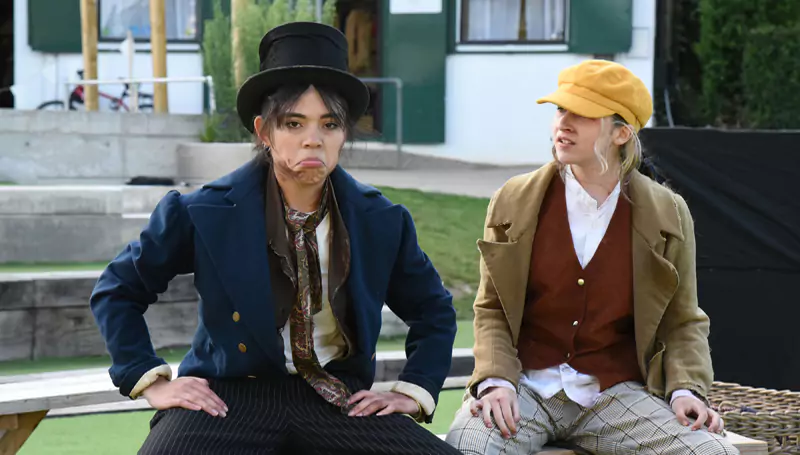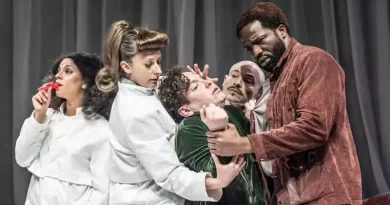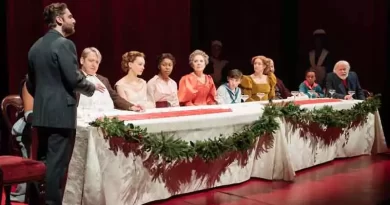“Oliver Twist”, by Identity Theatre at Brighton’s BOAT Theatre
Simon Jenner in East Sussex
10 August 2024
It seems the year for Oliver Twist. The Matthew Bourne/Cameron Mackintosh production of Oliver! continues at Chichester, set to transfer to the Garrick in December. In February there was an outstanding local production of Bart’s masterpiece at Theatre Royal Brighton with emphasis on the Stratford East tang of its origins, from orchestra to singing. Now Identity Theatre directed by Gary Cook and Nettie Sheridan bring Neil Bartlett’s adaptation to the stage.
Even here, in this dark rendition, singing in Sam Nixon’s arrangements of Anglican descant opens and closes proceedings, in mock sanctimonious retelling with Dodger as narrator. Though melodrama has not been invented by 1837 (Boucicault brought it to the 1850s), Bartlett makes explicit that Dickens in his theatrical retellings prefigures it. Dickens suggests the novel “should, like all murderous melodrama, present tragic and comic scenes in alternation, like the layers of red and white in a rasher of streaky bacon.” We get it lean.
The great strength of this production is ensemble storytelling and some first-rate performances. One indeed eclipses the weaker Chichester characterization of the same role.
Being open-air, clarity is paramount. Ambient microphones are placed around the stage perimeter, picking up what winds might blow away. Some need no such help. Cook, who also creates thunderous sound effects managed by Martin Oakley, adds stage props. These include an entrance flanked by portals, one with “Boy for Sale £5”. There is a rug and two chairs, a pulpit for the magistrate; all we need. Cast members helpfully parade with London areas like ‘Pentonville’ to underscore scenes.
Cook and Sheridan have trimmed Bartlett’s text, emphasising its vaudeville. Audience members throw out “Oh yeses!” to pantomime direction at certain points. Bartlett’s themes are rendered to a degree more family-friendly but decisively not excluded in the second act.
Zarrina Danaeva is a clarion-voiced Dodger, moving artfully though at times too restlessly, invoking the nickname. Bartlett’s comic framing as a morality tale owns a boomerang effect for Dodger at the end. Danaeva readily interacts with Fagin’s gang and the eponymous Oliver (Lily Wilks).
Wilks’s appealing Oliver Twist arrives with the trademark yellow cap. Following Bartlett, Wilks here presents as someone put upon by large forces, outshining them by presence rather than action. The character is presented as the catalyst on which darker chemicals explode.
Susanne Crosby, known also for directing, makes an amusingly wheedling Mr Bumble, scooping laughs and boos tugging Wilks around; offering her for sale, sniffing at derisory offers. It seems fitting that Widow Corney, later Mrs Bumble, dominates vocally in Charlotte Collingbourne’s dragonish dark hues, one of the most distinctive voices of the night.
Joanna Ackroyd’s narrow-columned hiss of a role as Mrs Sowerberry (later Mr Brownlow’s maid) is complemented by another vocally strong performance. Phil Nair-Brown is first put-upon Mr Sowerberry and a copper; but he scores particularly in the repeated “I’ll eat my head!” of Mr Grimwig, sceptic friend of Mr Brownlow. Nair-Brown gleams like an eighteenth-century scientist discovering the criminal type.
Max Hopkins bunches into overweening cry-bully Noah Claypole (later gang member Toby Crackit), and Tom Chitling (played by Olivia Jeffery). Charley Bates (Chloe McEwan) and Freya Sheridan’s Jimmy Riddle, earlier an amorous, petulant Charlotte Sowerberry, provide hyperactive scampering and ensemble brio.
Sam Nixon, sporting blue-tinted spectacles like some Edwardian master-criminal (Chris Horlock’s wigs and makeup to the fore) is a dark Fagin. Every move is a gambit, with the characterful “My dear” a sleight of advantage and blackmail. This prepares us for Fagin’s uncompromising end, both self-pitying and manipulative to the last. Vocally Nixon works the snarl, though on a windy night the sheer bite, if not venom, can get blown away.
Nancy (Flossie Noar) exudes Nancy’s unhappiness. Again, Bartlett cuts to thriller essentials but there are some moments with Wilks’s Oliver, and strong scenes with two powerful actors.
Rose Brownlow (Cathy Byrne) is not normally a principal role, but hers is one of the night’s great moments. As Rose, Byrne stares down father Mr Brownlow and in her exchange with Noar exudes sympathy, persuasion and authority. Every syllable is clear; Rose’s upright yet empathic character etched on turns of phras. This Byrne gels with Wilks’s Oliver too in a stand-out performance.
The other is Andy Bell’s glowering Bill Sikes. Bell looks the part too, with grime and reddened face. Bell strides vocally across the stage’s evenings shadows like a threat. His ringing commands, his lowering scowl and bark exude burnished malice. There’s threat in his hunched looks.
The production does not show violence to Oliver or Nancy save at the end; and there’s not so much physical theatre here as blocking (co-director Sheridan’s work). A Sikes to remember, even without Bullseye. A striking moment comes at the final chase, Bell clambering up the top of the stage-right concrete wing with a rope.
Another theatrical coup comes with Drew Paterson’s fine Mr Brownlow, in particular his literal wig-acting as magistrate Fang: at the same time. Another actor removes said wig as Brownlow answers, and drops it back as Fang sneers disdain. Only the irony of Brownlow not paying for a book in the pick-pocketing confusion means Oliver cannot be arraigned, even though Brownlow withdraws the charge.
Identity Theatre have developed from last year’s fine Under Milk Wood. The only failing there was lack of miced-up voices. Here, ambient mics partly compensate on a blowy evening. Vocally though, more of the cast need to be as powerful as Bell, Byrne, Collingbourne, Nair-Brown, and, when she stays still, Danaeva. Then it would be as spellbinding as anything Dickens and Bartlett imagine.









